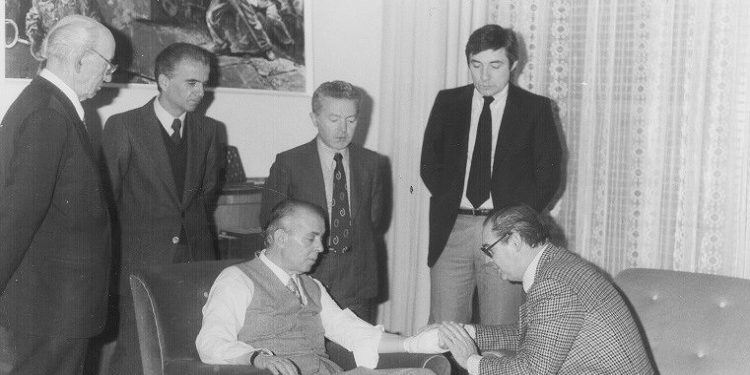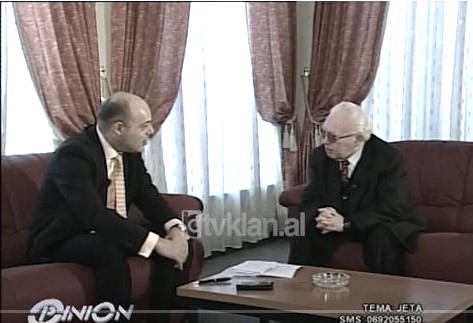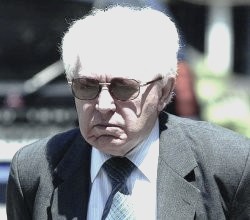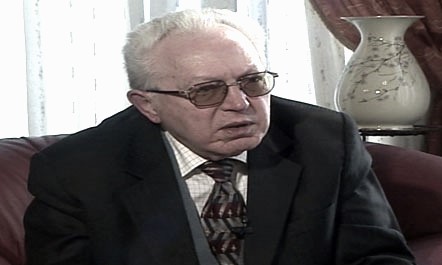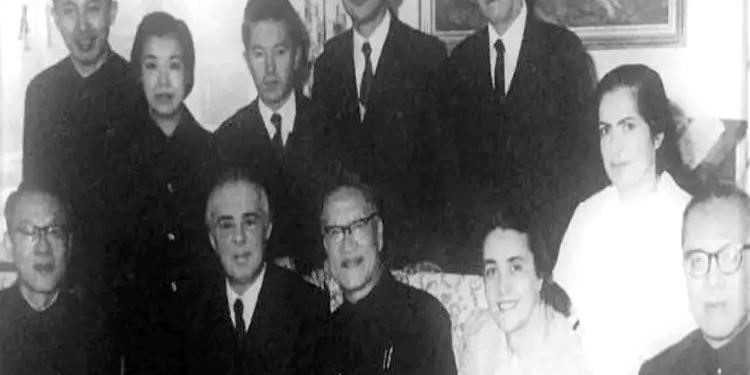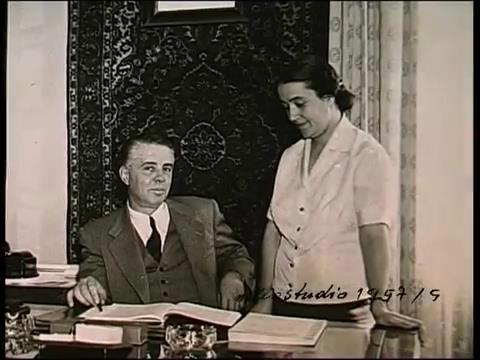By Blendi Fevziu
Part Two
Memorie.al / The well-known doctor and academician, Prof. Dr. Ylli Popa, originating from a renowned family with intellectual traditions from the city of Elbasan, graduated in Medicine in Bucharest and Moscow in the late 1950s, lecturer at the Faculty of Medicine in Tirana and founder of the Albanian school of Cardiology, former Chairman of the Academy of Sciences of the Republic of Albania from 1997 to 2007, former deputy of the People’s Assembly before the 1990s, decorated with various medals and orders, as well as the high title “Hero of Socialist Labour,” in 2007, gave a long testimony about his life and career as a doctor and academician to journalist Blendi Fevziu on the show “Opinion” on Tv Klan. In his testimony, Prof. Popa dwelt at length, describing how he became Enver Hoxha’s doctor, how the dictator was treated, the meeting with Nexhmije and Ramiz on the last night Enver Hoxha died, and how the news was announced, etc. We are publishing more about this, etc., in several issues of his interview.
Continues from the previous issue
Mr. Popa, for 10 years, did Enver Hoxha sleep with electrodes?!
No, not every night. In cases of need, when the situation called for it, according to medical indications, he accepted this, and of course, we did not stay in the room, but we had arranged it so that the electrode wires were long, and the apparatus was outside his room. But those electrodes registered the activity. To tell you the truth, when such an operation was done, I liked it.
Why?
I liked it because Enver was sleeping there, I understood from the apparatus that he was calm and sleeping, and I followed all his heart activity. But our place where we monitored Enver’s activity was in his library, with many wonderful books.
In what language were the books in Enver’s library?
Mainly in French. He even ordered books from abroad; from time to time, packages of books arrived, and he was delighted. The opening of the books was like a holiday for him, because they were luxurious books, of various types, and he enjoyed them.
He read a lot himself and had a good culture, a very good background. Well, we would set up that apparatus in the evening, as we would stay there all night. A thermos of warm coffee was set up, and a plate of apples, and we could drink coffee so as not to sleep.
I didn’t want to sleep, because I wanted to wander in the library. One night, I was alone next to the apparatus. Looking at the shelves, my hand caught a book; it was in French. It was the memoirs of Lavrentiy Beria, the Minister of Internal Affairs of the Soviet Union during the Stalin era.
Beria was a Georgian, from Georgia, like Stalin himself. I became curious about Beria’s memoirs and took the book, starting to read some things. I formed the conviction that they were not exactly his true memoirs. Turning the pages, I looked toward the middle of the book and saw an underlined page.
Was it underlined by Enver Hoxha?
It seems so, by Enver. The entire page was underlined, and I became curious about what had interested Enver. What I found was an extremely curious thing. Reading, my eye caught the name of Llukomski, my professor in Moscow. I read it carefully. Beria recounted: “I summoned Professor Llukomski to my office.”
And he told him; “I have called you here for a very secret matter, and you must not tell anyone about what will be discussed here. From the moment you leave this place, you will be followed, surveilled.” He was scared, he said of Llukomski, turned pale, and broke out in a sweat, which was natural.
He says; “Do you know of any medicine that can cause a sudden rise in blood pressure?” I told you above that Stalin suffered from hypertension. But he told him; “I am not asking you for it now, come back after a week, think about it and bring me that medicine if it exists.” But when he left, he told him; “Be careful, you will be surveilled.” He had no other choice but to take the medicine. And he took the medicine.
At that time, Stalin, along with other members of the Politburo (it was after World War II), would gather all together at a large table, have dinner together, watch wartime films, listen to old melodies of the time, discuss the wars, battles, etc., etc.
One night, Beria says; “I was sitting on Stalin’s right side, on the left side was Molotov. His glass of wine was barely touched. He excused himself, going to the bathroom, I think. I looked left and right,” says Beria, “escaped the eyes of the people, took the ampoule out of my pocket, broke it, and threw it into the glass.”
Stalin comes back, sits down, raises the glass, and says: ‘Let’s drink.’ At one point, he addresses Beria, ‘Did you put something in here?’ He was terrified, but he composed himself and said: ‘No, Comrade Stalin, how could I do that?!’ Then Stalin told him; “I was joking,” and drank the glass.
Was this Stalin’s last night?
It seems to me this was the last night, because I have also read the book by Stalin’s daughter, Svetlana Alliluyeva, ‘23 Letters to a Friend’, I must even have it at home. She relates that Stalin was not regular in treating his hypertension.
In fact, he had a maid there in the apartment that kept the medicines in a bedside table and gave him the pills. When she went the next morning, Stalin was on the floor; he had fallen to the edge of the bed and was in a coma.
Was this the part that Enver Hoxha had underlined?
Yes, this was it.
Were you terrified at that moment?
Of course, and I told Petrit Gaçe first. And he told me: “Oh my God, are we in danger?!”
Professor, we were talking earlier about the fear that existed in the group of doctors treating the dictator Hoxha. Were there personal reports between you and the communist leader, or were they just professional relationships?
Generally, they were professional relationships. That is, we would go when they called us, when there was any concern, or simply to take his blood pressure, check his heart, and so on. I understood that his mind was not on us; he had his big problems in his head, and he would leave: “Hello, hello.”
But there were cases when Enver himself would provoke you to talk, in the sense that he wanted to know, for example, certainly when he asked questions related to the hospital, or when he wanted to discuss books.
What kind of books did you discuss?
He himself encouraged me to talk about books, and he had an extraordinary memory, he remembered many names, authors, events; he knew those of the war, the houses where he had been sheltered during the War, he knew them all.
He was very fond of the issue of books; he had understood that I had also read that I was passionate about books and reading, which I still am.
Which part interested him more, from literature or from books in general?
He knew novels, historical books, and philosophical books; I saw them in the library.
Did he have any admiration for any specific historical figure?
No, he had not expressed it. To tell the truth, he was very emotional about Kosovo. I have heard many things that he sold it, he did…! You must have it to sell it; when you don’t have it, you can’t sell anything.
Was the group of doctors treating Enver Hoxha composed only of Albanians or were there foreign doctors as well?
No, there were foreign doctors as well.
Who were they?
There was a French doctor, Paul Milliez, who used to come. Before I went, he met with him, I don’t know if he examined him or not, but anyway, he was aware of his health. I remember that during a visit they called me to make, in the old house, we had transferred our medical service to a room nearby.
This was in a room that had a hearth, a lit fireplace; it has been in the newspapers for several days, Enver there with a checkered coloured scarf and the fire lit. I was looking for myself there, in case I was in that photo. The episode I am describing to you now came to my mind.
Enver called me there; Nexhmije was also present. She was always there. During that time, he had a weakness, a fatigue. I examined him with a stethoscope; I saw that his heart rhythm was very irregular. We call it “bigeminy”; he had a normal beat and an abnormal beat. This is a phenomenon that occurs frequently even in healthy people, and we don’t worry much.
But when it happens to a sick person who has just suffered a myocardial infarction, it is very serious for us, because it can transform at any moment, we say, into “ventricular fibrillation”. That is, the heart no longer beats, but fibrillates. I saw that he was looking at me carefully. I tried to compose myself. It was there that I found myself covered in cold sweat.”
Why?
Because of his condition, and the risk that this bigeminy could present. Then we decided to talk to Milliez. Milliez created a group of French specialists, a team like ours here, who would be aware of the changes Enver would have during the illness.
All our analyses here went there; they analyzed them and sent their opinion. At a certain moment, Hysni Kapo calls me to his office. He says to me: “We want to bring doctors from abroad; what do you say, should we bring them from the West or from China, the East.”
I told him that the Western doctors, whom I know better, are certainly very good specialists, but they have the disadvantage that they come and go. While the Chinese doctors can be stationed here for some time, you have them available. This interested us more. And they later decided themselves to bring a team from China.
How many doctors?
Four doctors.
Cardiologists?
No, one was a cardiologist. A very famous cardiologist who had studied in the USA, because that’s how they had it. He had also been Ho Chi Minh’s doctor, the First Secretary of the Communist Party of Vietnam, as he had also suffered a myocardial infarction some time before, and he travelled back and forth by special plane to Ho Chi Minh to treat him.
How long did the Chinese group stay?
The Chinese group stayed long, perhaps two months.
Were you in charge of Enver Hoxha’s medication, or were there trusted people?
This was arranged in this way. We, as the medical team, decided which medicine was needed, and gave the indication. The medicine was purchased by another group of people, which also included Security people, and the medicine was brought here, deposited in the family pharmacy.
They had a very good, very trustworthy nurse there, who genuinely loved Enver, and only she could enter the pharmacy.
Was she the only trusted person who could enter the family pharmacy and give Enver Hoxha medicine?
She went in and out of there. She gave it to the shift nurse to give to Enver. There was very strong control.
In what sense? There were rumours that the doctors somehow influenced to hasten Enver Hoxha’s death?
No possibility. We were 10 doctors there. The proposal of the medicine to be given, a Paracetamol, a vitamin, would be submitted for consultation. Medicines without consultation were not given.
In some memoirs published in a newspaper, you stated that at one point before his death, you and Professor Bajram Preza brought a medicine for Parkinson’s but did not give it to him. Can you explain this detail to me?
Yes, I even reminded Ramiz Alia of it at a conference; he didn’t remember it and then recalled. That is, we had diagnosed, Bajram Preza, that it was Parkinson’s, a serious neurological disease.
Was Enver Hoxha’s Parkinson’s severe?
It was severe. Bajram Preza insisted that he had Parkinson’s. This went to the French doctors, and the French neurologist thought it didn’t seem to be the case, without seeing the patient, but thought so based on the descriptions, the examinations. It was then decided that Bajram Preza and I should go to Vienna.
A very famous professor, world-renowned for Parkinson’s, Birkmayer, was there. But why did I go too, as I was a cardiologist, but the medicines given for Parkinson’s had a feature that irritated heart rhythm anomalies.
That is, they caused bigeminy, extrasystoles. I would say: “Hey Bajram…?” He would tell me: “This is the medicine.” “But what medicine,” I would say, “it messes up my work?!” So we both went to Birkmayer; he confirmed the diagnosis of Parkinson’s, from the description, from all the data, and I told him: “Agreed, you give him medicine, but these cause an increase in heart rate.”
“Look,” he tells me, “I have a medicine that I am testing myself now.” According to his proposal, this medicine was produced. He tells me that; “I have treated 70 people so far, and I see that it has good results in this regard.”
“If you want,” he told us, “I can give you some pills for you to try too.” “Agreed,” we said, “thank you.” And he goes and brings a penicillin bottle, a little bigger, but with a rubber stopper, penicillin. There were 10 pills of this type of medicine there, and we told him: “Thank you.”
When we returned from Vienna, Sulo Gradeci’s car was waiting for us at the airport. We went into Enver’s house. Ramiz Alia and Nexhmije greeted us there in the library. The four of us sat down at the table. Professor Preza began to talk about Professor Birkmayer, and at one point, the house phone rang.
Then Nexhmije tells us that Enver is calling her upstairs, Enver was in bed, upstairs. And she told us to continue, as she would be back soon. Bajrami continued to make his explanation; this coincided with the medicine the professor gave us in Vienna; he took out the medicine and gave it to Ramiz. Nexhmije was not there; she was upstairs. Ramiz took the medicine, looked at it, and…! Memorie.al




